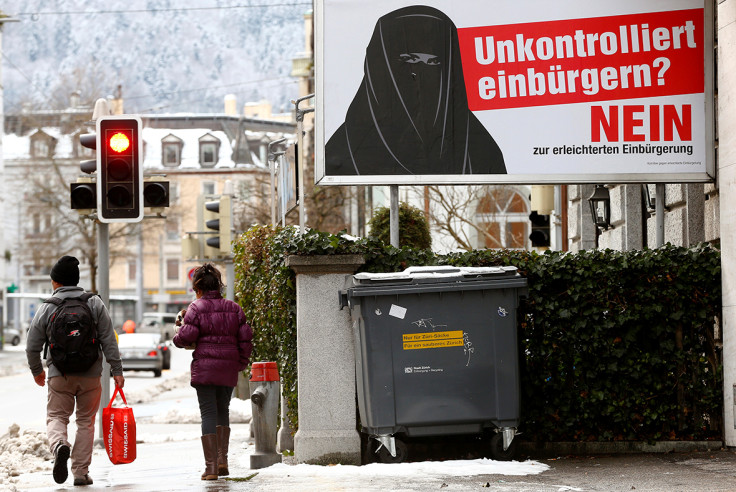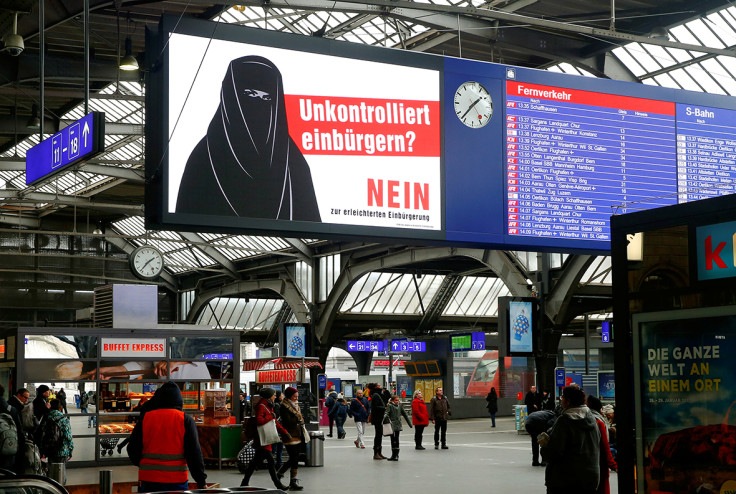Swiss commuters demand removal of burqa-shaming posters ahead of naturalisation vote
Swiss train stations prominently feature campaign posters from far-right party SVP.

A poster featuring a burqa-clad figure promoted by a Swiss far-right party and displayed in Switzerland's main train stations has stirred as controversy in the country, which is preparing to vote on a referendum to facilitate naturalisation processes on 12 February.
The political poster was commissioned by a committee co-led by a group of Swiss People's Party (SVP) politicians, also known as the Democratic Union of the Centre (UDC), the country's biggest party. Next to the drawing of a woman wearing a burqa, the poster reads: "Uncontrolled naturalisation? No to facilitated naturalisation".
The poster's claim that the proposed referendum would lead to "uncontrolled naturalisation" distorts the scope of the law which, in fact, would facilitate the naturalisation process of young third-generation immigrants only under certain controlled conditions.
These include: being born in Switzerland; being under 25 years of age; having completed at least five years of schooling in the country; holding a permanent residence permit; respecting Swiss law, order and values; speaking a national language (the official ones are Romansch, Italian, German and French).
There are also restrictions applying to the applicant's parents. One of them should have lived in Switzerland for a minimum of ten years, and have been schooled for at least five years in the country. One of the grandparents also needs to have either been born in Switzerland or have been granted permanent residency. A recent study quoted by The Local news website estimated that around 24,650 third generation immigrants aged nine to 25 in the country meet the criteria.

According to Swiss news channel 20 Minuten, many rail passengers have expressed anger, frustration and dismay at the controversial poster's prominent display in train stations across the country, through which thousands of people, Swiss and foreigners, transit every day.
"Freedom of religion has nothing to do with the easier naturalisation of the third generation. These are people born here, many Italians for example. They are integrated into the labour market and speak Swiss German," commuter Tina Schmitter told 20 Minuten. She wrote to the Swiss rail company SBB asking for the "immediate removal of the posters from the railway stations". The company was unable to give an estimate of how may complaints it had received.
A Facebook group that monitors the SBB's advertising standards called "Not like that, SBB" ("So nicht, SBB" in German) is one of the online forums in which rail passengers vent their frustrations over the ad. Many group members have condemned the displaying of the poster as "shameful" and "morally reprehensible". Schmitter posted the response she received to her email on the group.
An SBB representative wrote that the company's hands are tied in the matter, as the stations are seen as public spaces in the eyes of the law and the SBB is legally required to allow political advertising, no matter how controversial. "As long as political advertising does not constitute a breach of the law, we have no room for manoeuvre," the letter stated, adding "It's not our job to morally assess political advertising".
In a press release issued on 9 January presenting the burqa poster campaign for the upcoming referendum on 12 February, the SVP-led committee noted: "The foreign overpopulation and the massive increase in the number of Muslim people change Switzerland's very essence as well as our society and values."
Defending the imagery of the poster, the statement said it represented "a symbol of insufficient integration" and provided a list of instances which supposedly demonstrate such lack of integration. These included placing sharia law above Swiss law and various instances of perceived disrespect towards women. The list also mentions "young men who sexually harass women who do not stay at home like it is customary in their culture".
The Swiss anti-immigration party has carried out other controversial referendum campaigns in the past, such as the one proposing to expel EU citizens who committed crimes, which voters rejected. In that campaign, their poster featured a white sheep kicking out a black one.
© Copyright IBTimes 2025. All rights reserved.






















